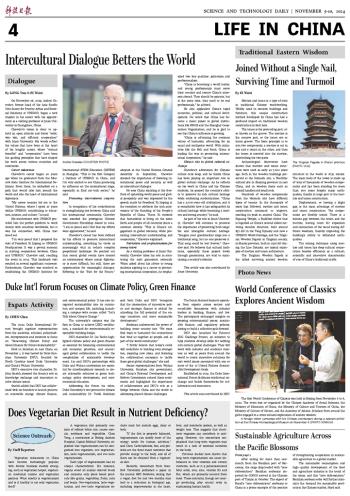
 Intercultural Dialogue Betters the World
Intercultural Dialogue Betters the World World Conference of Classics Explores Ancient Wisdom
World Conference of Classics Explores Ancient Wisdom Joined Without a Single Nail, Surviving Time and Turmoil
Joined Without a Single Nail, Surviving Time and Turmoil Duke Int'l Forum Focuses on Climate Policy, Green Finance
Duke Int'l Forum Focuses on Climate Policy, Green Finance Does Vegetarian Diet Result in Nutrient Deficiency?
Does Vegetarian Diet Result in Nutrient Deficiency? Sustainable Agriculture Across the Pacific Blossoms
Sustainable Agriculture Across the Pacific Blossoms
Vegetarian restaurants in China have become increasingly popular, with diverse business models emerging, such as vegetarian hotpot, vegetarian medicinal cuisine and vegetarian pastries. What exactly is vegetarianism and is it healthy to eat only vegetarian food?
A vegetarian diet primarily consists of refined white rice, coarse cereals, soybeans and vegetables. Chen Tong, a nutritionist at Beijing Anzhen Hospital, Capital Medical University, explained that vegetarianism can be categorized into veganism, ovo-vegetarianism, lacto-vegetarianism, and ovo-lacto vegetarianism.
Each type of vegetarianism has its unique characteristics. For instance, vegans avoid all animal-derived foods and consume only plant-based products like grains, vegetables, fruits, nuts and beans. Ovo-vegetarians, lacto-vegetarians, and ovo-lacto vegetarians exclude meat but include eggs, dairy or both.
"If the diet is properly balanced, vegetarianism can satisfy most of the energy needs for human activities," said Chen. Carbohydrates, fats, and proteins are the three major nutrients that provide energy to the body, and all of them can be obtained from a vegetarian diet.
Recently, researchers from Stanford University published a paper in the journal BMC Medicine, stating that a vegan diet for just two months may lead to a reduction in biological age, including improvements in the heart, liver, and metabolic system, as well as weight loss. This suggests that short-term veganism can contribute to anti-aging. However, the researchers emphasized that long-term veganism may result in a lack of essential nutrients in the body.
Previous studies have shown that long-term vegetarianism can cause imbalances in vital vitamins and certain nutrients, such as n-3 polyunsaturated fatty acids, iron, zinc, vitamin B2 and B12, which are primarily sourced from meat. These nutrients, though not energy-producing, play crucial roles in maintaining human health.






